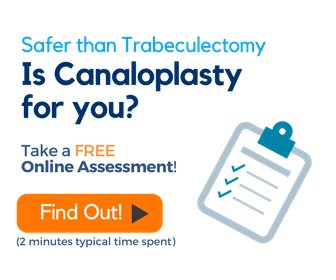There are two things nearly everyone with glaucoma hears if they are facing trabeculectomy glaucoma surgery:
- Vision lost to glaucoma cannot be regained
- An unlikely, but potential, risk of surgery is loss of vision
Not exactly comforting.
Vision May Actually Improve
It turns out we may have been wrong about the whole “vision lost to glaucoma cannot be regained” thing. Dr. Joseph Caprioli and colleagues have carefully evaluated the visual fields of patients who had undergone one of the most common forms of glaucoma surgery (trabeculectomy). All patients had at least four visual fields performed before as well as after surgery over at least an eight year period. What they found was an unexpected, but quite pleasant, surprise: vision may actually improve in some patients after glaucoma surgery has been done.
However, before you rush to your local glaucoma surgeon and demand to have “the surgery proven to improve my vision”, it’s worth taking a moment to evaluate just what actually improved in this study. First, what was known prior to the study: glaucoma surgery that successfully lowers the intraocular pressure (IOP) reduces the rate of vision loss. In other words, vision continues to be lost after glaucoma surgery (or any glaucoma treatment, for that matter), just not as quickly as prior to surgery (treatment). Indeed, in this study the average rate of overall visual field loss decreased from -2.5%/year to -0.6%/year. Essentially it would (on average) take a patient who had surgery four years to lose the same vision as they would have in only one year had they not elected to have surgery. That’s an outstanding reduction!
“But,” you say, “that is still an overall loss of vision. Where’s the gain?” It turns out to find the evidence of improved vision you must break the visual field into smaller sections of vision and evaluate each one. This is just what the authors of the study did. What they found was that although the overall field still worsened over time, there were individual sections of a patient’s field that would improve. In this glaucoma treatment study, 56% of visual field locations “decayed” (worsened) while 44% improved.
It gets more interesting. One would assume that prior to surgery pretty much all visual field locations would have been worsening. After all, if the IOP is high enough to cause progressive damage to the retinal nerve fiber layer, why would any field location improve? Well, there’s a reason my dad would tell me to avoid assumptions: because they are often wrong – as they are here. Before surgery 30% of visual field locations were noted to improve over time! What?!
Turns out the visual field sensitivity is a dynamic, almost psychedelic kaleidoscope of changing sensitivity. Glaucoma surgeons have always known that visual fields fluctuate, but this was thought to be due to variables such as testing subject wakefulness, quality of tear film, distractibility, etc. This study suggests that there may be more to these fluctuations than just how the patient is feeling that day. There may actually be areas of the field that do improve with time.
So, what do we do with this information? I can think of at least two things:
![]() Find encouragement to support the ongoing use of glaucoma medications or the choice to have surgery. If portions of one’s visual field can improve then the prospect of facing treatment becomes more bearable. Given that all glaucoma treatments are associated with side effects or risks, this could be the motivation needed to convince some patients of the value of treatment.
Find encouragement to support the ongoing use of glaucoma medications or the choice to have surgery. If portions of one’s visual field can improve then the prospect of facing treatment becomes more bearable. Given that all glaucoma treatments are associated with side effects or risks, this could be the motivation needed to convince some patients of the value of treatment.
![]() We should be very skeptical of any glaucoma treatment that advertises “improvement” in vision. It is very common for alternative medicine providers to point to individual locations on two visual fields (one pre-treatment and another post-treatment) and state, “See, your field is improving. The treatment worked!” Knowing that even without surgery 30% of the visual field (on average) may spontaneously improve, it’s simply disingenuous to conclude that any treatment (conventional or alternative) has successfully improved one’s field based on only two (or even three) field exams. As much as those facing the fear of loss of vision want to believe an individual treatment is working for them, it is important for the protection of their own vision that they see through this common ruse. The cost of not doing so is, unfortunately, permanent loss of vision and hard-earned funds.
We should be very skeptical of any glaucoma treatment that advertises “improvement” in vision. It is very common for alternative medicine providers to point to individual locations on two visual fields (one pre-treatment and another post-treatment) and state, “See, your field is improving. The treatment worked!” Knowing that even without surgery 30% of the visual field (on average) may spontaneously improve, it’s simply disingenuous to conclude that any treatment (conventional or alternative) has successfully improved one’s field based on only two (or even three) field exams. As much as those facing the fear of loss of vision want to believe an individual treatment is working for them, it is important for the protection of their own vision that they see through this common ruse. The cost of not doing so is, unfortunately, permanent loss of vision and hard-earned funds.
Doctors Caprioli and colleagues should be appreciated for their contribution to the understanding of the complex behavior of visual fields over time. Only through such sophisticated understanding will we be able to truly separate out the treatments that work versus what is only wishful thinking. Perhaps someday scientists will discover what is different about retinal ganglion cells associated with the sections of visual field improvement and use this knowledge to design a more effective treatment of glaucoma.
References
- Caprioli J, de Leon JM, Azarbod P, et al. Trabeculectomy Can Improve Long-Term Visual Outcome in Glaucoma. Ophthalmology. 2015;[article in press]: 1-12
- Werner EB, Drance SM, Schulzer M. Trabeculectomy and the progression of glaucomatous visual field loss. Arch Ophthalmol. 1977;95:1374–7.
- Kidd MN, O’Connor M. Progression of field loss after trabeculectomy: a five-year follow-up. Br J Ophthalmol. 1985;69:827–31.

David Richardson, MD
Medical Director, San Marino Eye
David Richardson, M.D. is recognized as one of the top cataract and glaucoma surgeons in the US and is among an elite group of glaucoma surgeons in the country performing the highly specialized canaloplasty procedure. Morever, Dr. Richardson is one of only a few surgeons in the greater Los Angeles area that performs MicroPulse P3™ "Cyclophotocoagulation" (MP3) glaucoma laser surgery. Dr. Richardson graduated Magna Cum Laude from the University of Southern California and earned his Medical Degree from Harvard Medical School. He completed his ophthalmology residency at the LAC+USC Medical Center/ Doheny Eye Institute. Dr. Richardson is also an Ambassador of Glaucoma Research Foundation.



